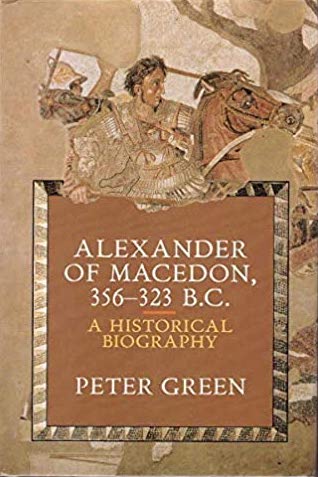This one comes from ALEXANDER OF MACEDON, 356-323 B.C.
A Historical Biography by Peter Green.

[Alexander’s father] Philip’s training for power was proceeding along useful if unorthodox lines. His experience as a member of the Macedonian royal household had given him an understandably cynical view of human nature: in this world murder, adultery and usurpation were commonplace, as liable to be practiced by one’s own mother as by anyone else. In later life Philip took it as axiomatic that all diplomacy was based on self-interest, and every man had his price: events seldom proved him wrong. [Italics added.] In Thebes he saw, too, the besetting weaknesses of a democratic city-state—constant party intrigue, lack of a strong executive power, the inability to force quick decisions, the unpredictable vagaries of the assembly at voting-time, the system of annual elections which made any serious long-term planning almost impossible, the amateur ad hoc military levies (though here Thebes was better off than, say, Athens). For the first time he began to understand how Macedonia’s outdated institutions, so despised by the rest of Greece, might prove a source of strength when dealing with such opponents. Throughout his life he gained his greatest advances by exploiting human cupidity and democractic incompetence—most often at the same time. [Italics added.]





JAN HERMAN CLAIMS TRUMP GREATEST LEADER SINCE FATHER OF ALEXANDER THE GREAT, BARON PREPARES FOR SHORT BUT ILLUSTRIOUS LIFE VOYAGE. HERMAN FLEES CITY AS ANGRY MOBS GATHER.. MAYOR OF NEW YORK ISSUES LIFETIME BAN.
gosh, Jan, that rural air must have gone to your head!
really?
Well, I don’t think so but assumed reference and by extrapolation
“Fascinating Passages from Fascinating Books” – am I to assume that the book addresses Greek culture and society prior to Greeks adopting a phonetic alphabet?
A Wikipedia article claims that Greeks made use of a phonetic alphabet the during the late ninth or early eighth century BC.
If that is the case, then the author of said fascinating book addresses Greek societies while it was in a state of primary orality.
I’ve been reading about the transition that Greeks made from a state of primary orality to a culture that became involved with writing with an alphabet fully outfitted with vowels and consonants.
How Greeks managed changes from exclusive orality to alphabetic literacy is very interesting.
In “The Muse Learns To Write,” Eric Havelock provides a detailed study of how this period of change for Greek society managed to incorporate both oral and written tradition values into their society.
Havelock explains that a major change was to abandon the oral tradition of using what we call ‘poetry’ for news and entertainment.
The change to visible media from audible media had the Greeks making the most of the situation while throwing poetry overboard but keeping many oral tradition values, like trust and sharing.
What I want to know is how the hell they understood anything they wrote without putting spaces between words.